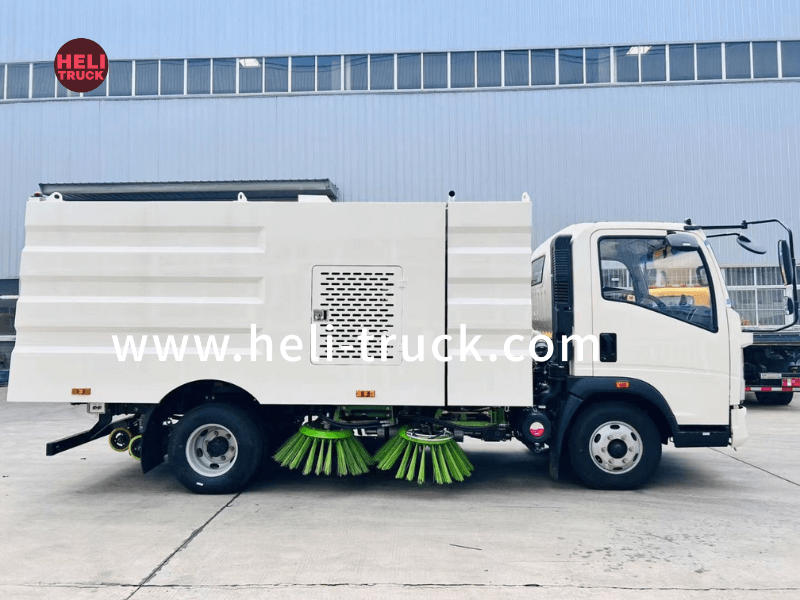The Environmental Impact of Garbage Compactor Trucks A Comprehensive Analysis
Introduction: Garbage compactor trucks play a crucial role in managing municipal waste and ensuring clean and healthy living environments for communities around the world. These specialized vehicles are designed to collect, compact, and transport solid waste efficiently and effectively. However, the operation of garbage compactor trucks also comes with environmental implications that need to be carefully examined and addressed. This article will provide a detailed analysis of the environmental impact of garbage compactor trucks, considering factors such as emissions, fuel consumption, waste management practices, and potential solutions to mitigate their environmental footprint. Emissions and Air Quality: One of the primary environmental concerns associated with garbage compactor trucks is their emissions of pollutants that contribute to air pollution and climate change. These vehicles typically run on diesel fuel, which releases harmful substances such as nitrogen oxides (NOx), particulate matter (PM), and carbon dioxide (CO2) into the atmosphere. NOx and PM are known to have adverse health effects on humans, including respiratory problems and cardiovascular diseases. Additionally, CO2 is a greenhouse gas that contributes to global warming and climate change. The frequent start-stop nature of garbage collection routes can result in inefficient fuel combustion and increased emissions of pollutants. Idling, acceleration, and braking cycles during waste collection operations can lead to higher fuel consumption and emissions compared to continuous driving. Strategies such as route optimization, engine tuning, and driver training can help reduce emissions and improve the overall environmental performance of garbage compactor trucks. Waste Management Practices: In addition to emissions, the waste management practices associated with garbage compactor trucks can also have environmental impacts. Improper handling and disposal of solid waste can lead to pollution of water bodies, soil contamination, and habitat destruction. Leachate from landfills, where collected waste is deposited, can seep into groundwater and surface water, carrying with it harmful substances and pollutants. Furthermore, the composition of waste collected by garbage compactor trucks can vary significantly, including organic, recyclable, and non-recyclable materials. Effective waste segregation at the source and proper sorting at transfer stations are essential to maximize recycling and minimize the amount of waste sent to landfills. Recycling and composting programs can help divert valuable resources from the waste stream and reduce the environmental impact of waste disposal. Energy Efficiency and Alternative Fuels: To address the environmental impact of garbage compactor trucks, there is a growing trend towards improving energy efficiency and exploring alternative fuel options. Hybrid and electric garbage trucks are becoming more prevalent in urban areas, offering lower emissions and reduced fuel consumption compared to traditional diesel vehicles. Electric trucks produce zero tailpipe emissions and can be charged using renewable energy sources, further reducing their environmental footprint. In addition to electrification, other alternative fuels such as compressed natural gas (CNG) and renewable diesel are being adopted by some waste management companies to reduce emissions and dependence on fossil fuels. CNG-powered trucks emit lower levels of pollutants and greenhouse gases compared to diesel vehicles, making them a cleaner alternative for waste collection operations. Renewable diesel, derived from sustainable feedstocks such as vegetable oils and animal fats, offers similar environmental benefits while being compatible with existing diesel engines. Technology and Innovation: Advancements in technology and innovation are driving improvements in the environmental performance of garbage compactor trucks. Telematics systems, onboard sensors, and route optimization software are being used to optimize waste collection routes, reduce idling time, and improve fuel efficiency. Real-time monitoring of vehicle performance and driver behavior can help identify areas for improvement and enhance the overall sustainability of waste management operations. Furthermore, https://www.heli-truck.com/aerial-platform-truck/ of autonomous and semi-autonomous garbage trucks is revolutionizing the waste collection industry. These vehicles utilize artificial intelligence, machine learning, and robotics to automate waste collection processes, reduce human error, and minimize environmental impact. Autonomous garbage trucks can operate more efficiently, with optimized routes and reduced fuel consumption, ultimately leading to lower emissions and improved air quality in urban areas. Community Engagement and Education: Effective waste management and environmental protection require the active participation and engagement of local communities. Education programs, public awareness campaigns, and community outreach initiatives can help raise awareness about the environmental impact of garbage compactor trucks and the importance of sustainable waste management practices. Encouraging residents to reduce, reuse, and recycle their waste can help minimize the amount of material sent to landfills and maximize resource recovery. Moreover, partnerships between waste management companies, local governments, and environmental organizations can facilitate the development of innovative solutions to address the environmental challenges associated with garbage compactor trucks. Collaboration on waste reduction strategies, recycling programs, and clean energy initiatives can create a more sustainable waste management system that benefits both the environment and the community. Conclusion: In conclusion, garbage compactor trucks play a vital role in managing municipal waste and maintaining clean and healthy living environments. However, the environmental impact of these vehicles must be carefully considered and addressed to minimize their negative effects on air quality, climate change, and natural ecosystems. By adopting energy-efficient technologies, alternative fuels, and sustainable waste management practices, the environmental footprint of garbage compactor trucks can be significantly reduced.  Furthermore, community engagement, education, and innovation are essential components of a comprehensive approach to mitigating the environmental impact of waste collection operations. By working together towards a common goal of environmental sustainability, we can create a cleaner, greener future for generations to come. Garbage compactor trucks have the potential to be part of the solution to our waste management challenges, contributing to a more circular economy and a healthier planet for all.
Furthermore, community engagement, education, and innovation are essential components of a comprehensive approach to mitigating the environmental impact of waste collection operations. By working together towards a common goal of environmental sustainability, we can create a cleaner, greener future for generations to come. Garbage compactor trucks have the potential to be part of the solution to our waste management challenges, contributing to a more circular economy and a healthier planet for all.